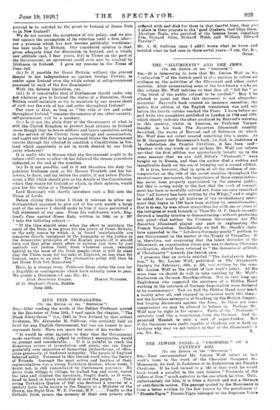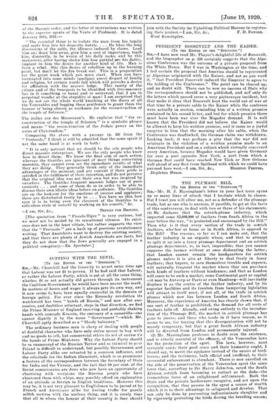THE JEWISH PERIL—A " PROTOCOL " OF A CENTURY AGO.
(To THE EDITOR or TEM " SPECTATOR."'
SIR,—Your correspondent Mr. Lucien Wolf refers in last week's issue to the work of the Chevalier Gougenot des Monsseaux, Le Juil. le Judaisme at la Judaisation des Peuples Chrgtiens. If he had turned to p. 342 of that work he would have found a parallel to the now famous " Protocols of the Elders of Zion " much anterior to the one which he cites. Only, unfortunately for him, it is from a Jewish and not a German or anti-Semite source. The passage quoted by dee Mousseaux is from a letter written by the Jew known by the pseudonym of "Picoolo-Tigre." Piccolo-Tigre belonged to the Supreme Vents of the Masonic order, and his letter of instructions was written to the superior agents of the Vente of Piedmont. It is dated January 18th, 1822 :—
" The essential thing is to isolate the man from his family and make him lose his domestic habits. . . . Ho likes the long discussions of the cafés, the idleness induced by shows. Lead him on; draw him away, give him a sort of importance, teach him, discreetly, to be weary of his daily tasks, and by this manoeuvre, after having shewn him how painful- are his duties, implant in him the desire for another kind of life. Man is born a rebel. Stir this desire of rebellion up to the burning point, but don't let the fire break out. This is a preparation for the great work which you must start. When you have insinuated into some minds (quelques ames) disgust of family and religion, let certain words fall which will provoke a desire for affiliation with the nearest lodge. This vanity of the citizen and of the bourgeois to he identified with free-masonry has in it something so banal and so universal, that I am in perpetual wonder at the stupidity of man! I am surprised that we do not see the whole world knocking at the doors of all the Venerables and begging these gentlemen to grant them the honour of being chosen as workmen for the reconstruction of the temple of Solomon."
The italics are des Mousseaux's. He explains that " the re- construction of the temple of Solomon" is a symbolic phrase and means "the reconstruction of the Judaic power on the ruins of Christendom."
Comparing the above with a passage (p. 53) from •the " Protocols," I think it will be admitted that the same spirit if not the same hand is at work in both: " It is only natural that we should be the sole people who direct masonic enterprises. We are the only people who know how to direct them. We know the final aim of each action, whereas the Gentiles are ignorant of most things concerning masonry, they cannot even see the immediate results of what they are doing. They generally think only of the immediate advantages of the moment, and are content if their pride is satisfied in the fulfilment of their intention, and do not perceive that the original idea was not their own but was inspired by ourselves. The Gentiles frequent masonic lodges out of pure curiosity . . . and some of them do so in order to be able to discuss their own idiotic ideas before an audience. The Gentiles are on the look-out for the emotions of success and applause; these are distributed freely by us . . . You have no idea how easy it is to bring even the cleverest of the Gentiles to a ridiculous state of naiveté by working on his conceit," &c.
[The quotation from " Piccolo-Tigre " is very curious, but we must not be misled by its sensational vileness Its exist- ence does not in the least vitiate, but rather supports the view that the " Protocols " are a hash up of previous revolutionary writing. That Anarchists want to destroy the existing society, and that there are plenty of Jewish Anarchists are facts, but they do not show that the Jews generally are engaged in a political conspiracy.—ED. Spectator.]







































 Previous page
Previous page